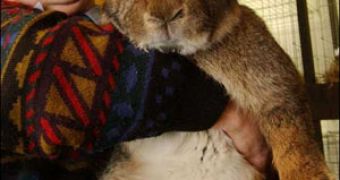As if rabbits reproducing like mad (from one female you can get 60 rabbits with all her descendants) weren't enough, China has now succeeded in producing the world's first cloned rabbit by employing a technology that takes cells from a fetus.
"The female rabbit, which weighed 60 grams at birth in February, was now growing normally at an animal center in Shanghai," the China Daily said.
Since the first clone was born, the famous sheep Dolly in 1996, scientists have cloned mice, cattle, dogs, monkeys, cats, goats and other species. Malaysia is even attempting to clone some of its threatened leatherback turtles to save them from extinction.
In 2002, a French team produced the world's first cloned rabbit by employing cells from an adult female rabbit.
"The Chinese rabbit was the world's first to be cloned using "fibroblast" cells from a fetal rabbit," said the China Daily. The experiment was led by Dr Li Shangang, a researcher at the National Center for Molecular Genetics and Animal Breeding of the Beijing Institute of Animal Sciences.
"Fibroblast cells from fetal rabbits can be cultured for longer periods than those from adult rabbits; so they are better materials for gene modification and gene targeting research," Li said.
The team took back skin cells of a 20-day old rabbit embryo and cultivated them into fibroblast cell lines. The fibroblast cells were used as the donor cell and their DNA inserted into an enucleated rabbit's oocyte (immature egg cell of animal ovary) through electric pulse.
The cloned embryos were transplanted into the rabbit's oviduct and after a month-long normal pregnancy, the cloned rabbit was born.
Rabbits are widely used in research as they have a much shorter gestation period than larger mammals like sheep or cows. "The advantage is that rabbits reproduce so quickly. Combined with the cloning technique, this would allow the researchers to create genetically modified rabbits for medical research very quickly," Li said.

 14 DAY TRIAL //
14 DAY TRIAL //